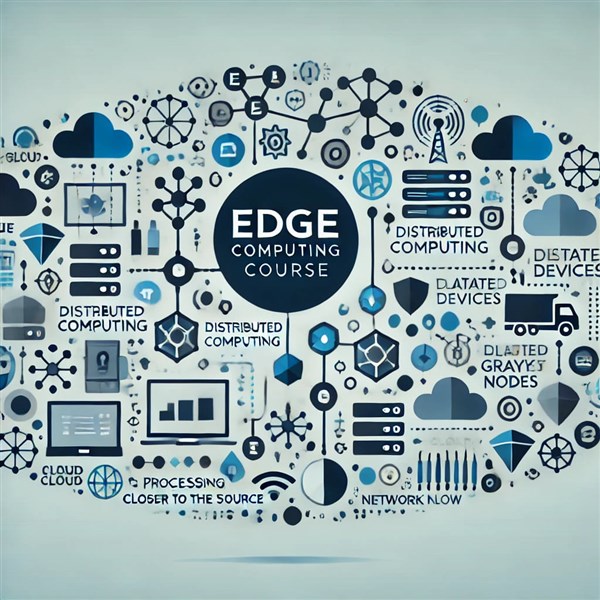
The advent of the digital age has led to the emergence of new technologies and methodologies. One such technology that has been rapidly gaining momentum is Edge Computing. This technology aims to bring computation and data storage closer to the location where it's needed, to improve response times and save bandwidth. With the rising demand for professionals in this field, many individuals are now looking for the best edge computing certification and training programs. But how do you choose the right one? This comprehensive guide will help you navigate through your choices.
Understanding Edge Computing
Before diving into course selection, it's important to understand what edge computing entails. Edge computing processes data at or near the data source rather than relying solely on centralized cloud servers. This approach helps reduce latency, improve speed, and enhance overall performance. Common applications include smart cities, autonomous vehicles, healthcare, and industrial IoT. Professionals in this field need a strong grasp of networking, data management, and security principles, making relevant training vital.
Factors to Consider When Choosing an Edge Computing Course
1. Define Your Career Goals
The first step in selecting an edge computing course is to clearly define your career goals. Are you looking to start a career in edge computing, or do you want to advance your existing skills? Your goals will dictate the type of course you should pursue.
- Entry-Level: If you’re new to the field, look for introductory courses that cover the fundamentals of edge computing. These may include topics like basic networking, cloud computing principles, and an overview of edge technologies.
- Advanced: If you already have a background in IT, software development, or data analysis, consider advanced courses that delve deeper into specific technologies, architectures, and real-world applications of edge computing.
2. Assess Your Current Skill Level
Understanding your current skill level is essential in choosing the right course. Consider taking an assessment test or reflecting on your experience in related fields such as networking, cloud computing, or data science.
- Beginners: If you are a novice, look for courses that start with the basics and gradually progress to more complex concepts. Courses with hands-on projects and practical exercises can greatly enhance your understanding.
- Intermediate to Advanced Learners: If you have prior knowledge, seek out specialized courses that focus on specific edge computing technologies (e.g., AWS IoT, Microsoft Azure IoT Edge) or real-world case studies.
3. Course Content and Curriculum
Examine the course syllabus to ensure it covers the topics most relevant to your career goals. Here are some essential topics to look for:
- Fundamentals of Edge Computing: An introduction to the concept of edge computing, its benefits, and its differences from cloud computing.
- Networking Principles: Understanding network topologies, protocols, and configurations essential for edge devices.
- Data Processing and Analytics: Techniques for managing, processing, and analyzing data at the edge.
- Security and Privacy: Strategies for ensuring the security of edge devices and data, including encryption and access control.
- Real-World Applications: Case studies that demonstrate how edge computing is used across different industries.
4. Mode of Learning
Consider how you prefer to learn. Courses are typically offered in various formats, including:
- Online: These courses offer flexibility and convenience, allowing you to learn at your own pace. Look for courses that provide video lectures, quizzes, and discussion forums for interaction with instructors and peers.
- In-Person: If you thrive in a traditional classroom setting, consider local workshops or training sessions. In-person courses can provide direct interaction with instructors and networking opportunities with fellow learners.
- Hybrid: Some programs combine online and in-person elements, offering the benefits of both modes.
5. Instructor Credentials
Research the qualifications and expertise of the instructors. Look for courses taught by professionals with extensive experience in edge computing and related fields. Instructors with a strong industry background can provide valuable insights, real-world examples, and practical knowledge that enhance the learning experience.
6. Accreditation and Recognition
Check whether the course is accredited or recognized by industry standards. Accreditation ensures that the course meets specific quality standards and is respected in the industry. Courses offered by reputable institutions or platforms (such as Coursera, edX, or LinkedIn Learning) are often more credible.
7. Hands-On Experience
Practical experience is crucial in edge computing. Look for courses that offer hands-on projects, labs, or simulations that allow you to apply what you've learned in a real-world context. Building projects will enhance your understanding and help you develop a portfolio to showcase your skills to potential employers.
8. Peer Reviews and Testimonials
Before enrolling, seek out reviews and testimonials from previous students. Feedback can provide valuable insights into the course's strengths and weaknesses. Look for comments on the quality of the material, instructor engagement, and overall learning experience. Platforms like Course Report and Udemy often feature student reviews that can guide your decision.
9. Cost and Budget
Consider your budget when selecting an edge computing course. Costs can vary significantly based on the provider, course length, and depth of content. Some platforms offer financial aid or payment plans, making it easier to manage expenses. Weigh the potential return on investment (ROI) of the course against its cost.
10. Networking Opportunities
Networking is an invaluable aspect of any educational experience. Look for courses that provide opportunities to connect with industry professionals, instructors, and fellow learners. Joining forums, attending webinars, or participating in group projects can facilitate networking and lead to job opportunities in the future.
Recommended Edge Computing Courses
To help you get started, here are a few recommended edge computing courses that meet various needs:
-
AWS Certified Solutions Architect – Associate
- This course covers cloud computing and edge solutions using AWS technologies, making it ideal for those looking to enter the cloud computing and edge arena.
- Introduction to Edge Computing by Coursera
- This beginner-friendly course provides an overview of edge computing concepts and applications, perfect for those new to the field.
- Designed for those familiar with Azure, this course focuses on deploying and managing IoT solutions at the edge.
- This comprehensive course delves into the fundamentals of edge computing and its practical applications across industries.
- Aimed at experienced professionals, this course focuses on designing and implementing IoT and edge computing architectures.
- Azure IoT Edge by Microsoft
- Edge Computing Essentials by edX
- IoT and Edge Computing for Architects by LinkedIn Learning
Conclusion
Choosing the right edge computing course is a critical step in advancing your career in this dynamic field. By defining your career goals, assessing your skill level, and considering various factors such as course content, mode of learning, and instructor credentials, you can select a course that aligns with your aspirations. With the right education and practical experience, you’ll be well-equipped to navigate the challenges and opportunities that come with the evolving landscape of edge computing. Investing in your education today can lead to a successful and fulfilling career tomorrow.
Koenig Solutions is a leading IT training company offering top-notch edge computing training and certification programs. Our courses are designed by industry experts and cover all the essential aspects of edge computing. We provide flexible learning options, including online and classroom-based training, making it easier for professionals to learn at their convenience. With Koenig Solutions, you can be assured of gaining the skills you need to excel in your edge computing career.
Choosing the right edge computing course is the first step towards a successful career in this field. Do your research, understand your requirements, and make an informed decision. Good luck!







COMMENT